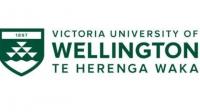Master of User Experience Design
The MUXD is a Wellington ICT Graduate School programme delivered by the School of Design Innovation at Victoria University of Wellington.
User experience design is one of the largest growing design fields that addresses all aspects of user experience from understanding the identity of the users to the creation of the designs they interact with. User experience designers work across digital and physical media to improve the overall experience of design. User experience designers are skilled researchers, critical and creative thinkers, effective communicators and expert design practitioners.
The Master of User Experience Design (MUXD) is a one-year, full-time, 180 point master’s degree. It is aimed at industry professionals and/or recent graduates without an undergraduate qualification in media design, i.e. a conversion master’s degree.
The degree will build on the relevant skills these students have developed during their professional careers and/or undergraduate university study, such as problem solving, critical thinking and verbal and written communication.
Matauranga Design—CCDN 412 (15 points): This course engages with toi (Maori creativity) and matauranga (Maori understanding) in the production of both visual and material cultural design that honours our place and past in Aotearoa New Zealand. Guided by traditional Maori protocols and knowledge, students will learn how to understand and interact with Maori symbols and visual spatial strategies in ways that are culturally sound and appropriate.
Graphic Design Practice—MDDN 413 (15 points): In this course students will explore and utilise graphic design elements, software, and strategies in the pursuit of a body of design work, while analysing ways to leverage personal experience and unique backgrounds. Through research, exercises and projects, students will develop technical mastery, formal graphic design skills and independent research skills towards expressing a unique visual identity.
User Experience Design Practice—MDDN 417 (30 points): In this course students will become adept at the techniques common to user experience (UX) design, such as: research into persona development, case study analysis, user interface design, rapid visualization and prototyping. Students will also become adept at using the industry standard tools and techniques of UX design.
Trimester Three
Advanced User Experience Studio—MDDN 416 (30 points): In this course students will analyse and conceive user experience design and research concepts, techniques and strategies. Moving from research, prototyping, evaluation, and similar user experience design essentials, the course will explore more complex issues through an independent project requiring in-depth research relating to context and audience.
Choose one of the following elective courses:
Digital Product Design—MDDN 402 (30 points): In this course students will explore and implement current digital product design methods and software while planning and deploying independent project strategies. An emphasis will be placed on design thinking and creative approaches to front-end development, design and prototyping techniques based on industry related projects. Students will be encouraged to synthesize their unique backgrounds and personal experience within the projects
Information Design Practice—MDDN 415 (30 points): This course examines best practice for designing with information, including the importance of research, understanding the context or data, and anticipation of the intended audience. Topics will span the techniques and concepts related to data acquisition, modelling, and developing innovative ways of displaying Information through different media.
Trimester One
User Experience Design Practicum—MDDN 502 (60 points): This studio consists of a supervised research-based practicum, working towards a mastery of user experience research through a specified design project. The work will be experimental in nature, generally as a placement in industry, yet at the same time, require a conceptual approach that leverages a criticism of the status quo.
Campus Information
Wellington
Wellington is the capital city of New Zealand
Intakes
- Feb
- July
- Nov
Application Processing Time in Days: 20
Application Process
Minimum English Language Requirements
| English Level Description | IELTS (1.0 -9.0) | TOEFL IBT (0-120) | TOEFL CBT (0-300) | PTE (10-90) | |
|---|---|---|---|---|---|
| Expert | 9 | 120 | 297-300 | 86-90 | |
| Very Good | 8.5 | 115-119 | 280-293 | 83-86 | |
| Very Good | 8 | 110-114 | 270-280 | 79-83 | |
| Good | 7.5 | 102-109 | 253-267 | 73-79 | |
| Good | 7 | 94-101 | 240-253 | 65-73 | |
| Competent | 6.5 | 79-93 | 213-233 | 58-65 | |
| Competent | 6 | 60-78 | 170-210 | 50-58 | |
| Modest | 5.5 | 46-59 | 133-210 | 43-50 | |
| Modest | 5 | 35-45 | 107-133 | 36-43 | |
| Limited | 4 | 32-34 | 97-103 | 30-36 | |
| Extremely Limited | < 4 | < 31 | < 93 | < 30 |
Job Opportunity Potential
Wellington Careers and Employment
Get connected with employers and the community and prepare for your future employment. Develop your skills and experiences through our programmes and launch your career with confidence.
CV checks
Get your CV checked at a drop-in session.
Talk to someone
Make an appointment for one-to-one guidance with a careers consultant.
Network with employers
Explore your career possibilities and network with potential employers at our expos and other upcoming events.
Employers
Engage with us to build your organisation’s profile on campus and connect with our talented students and graduates.
Graduate recruitment
We host a number of graduate recruitment events throughout the year, where you can meet potential employers and find out about jobs and internships.
PSW Opportunity
- During study, all students on a student visa can work up to 20 hours per week during semester and full time during vacations.
- After completing Level 7 Bachelor’s Degree or Higher Qualification, a student will get a three years open post-study work visa.
- After completing Level 8 Post Graduate courses of 1 year, students get 1 year PSW.
Admission Requirement / Eligibility Criteria
For entry into a programme at postgraduate level (including a graduate diploma, Honour’s degree, postgraduate diploma, or Master’s degree), as a minimum, you need the equivalent of a Bachelor’s (undergraduate) degree from a recognised institution with at least a B average.
A background in a particular subject area may be required or recommended. Entry is at the programme director’s discretion.
IELTS (Academic)
Overall band of 6.5 with no sub-score below 6.0
TOEFL (iBT)
A score of 90 on the internet-based test with at least 20 in writing
Pearson Test of English (Academic)
A score of 58 with a ‘Communicative’ score of not less than 50
C1 Advanced (formerly known as Cambridge English: Advanced (CAE))
A score of 176 or higher, with each skill score no less than 169
C2 Proficiency (formerly known as Cambridge English: Proficiency (CPE))
A score of 176 or higher, with each skill score no less than 169
New Zealand Certificates in English Language (NZCEL)
NZCEL Level 5 (Academic)
Victoria University of Wellington English Proficiency Programme (EPP)
A minimum of two ratings of 5 and two ratings of 4
English New Zealand's Accredited Pathway Assessment
English New Zealand Accredited Pathway Assessment Level 3 (with no skill lower than Level 2)
- Course Type: Online
- Course Level: Masters/PG Degree
- Duration: 01 Year 06 Month
-
Total Tuition Fee:
64500 NZD
Annual Cost of Living: 20000 NZD
Application Fee: N/A
Similar Programs
- Master of Urban and Regional Planning at Victoria University of Wellington
- Master of Music Therapy by research at Victoria University of Wellington
- Master of Music Therapy by coursework and research at Victoria University of Wellington
- Master of Indigenous Studies at Victoria University of Wellington
- Master of Communication – MC at Victoria University of Wellington
- Master of Strategic Studie at Victoria University of Wellington

